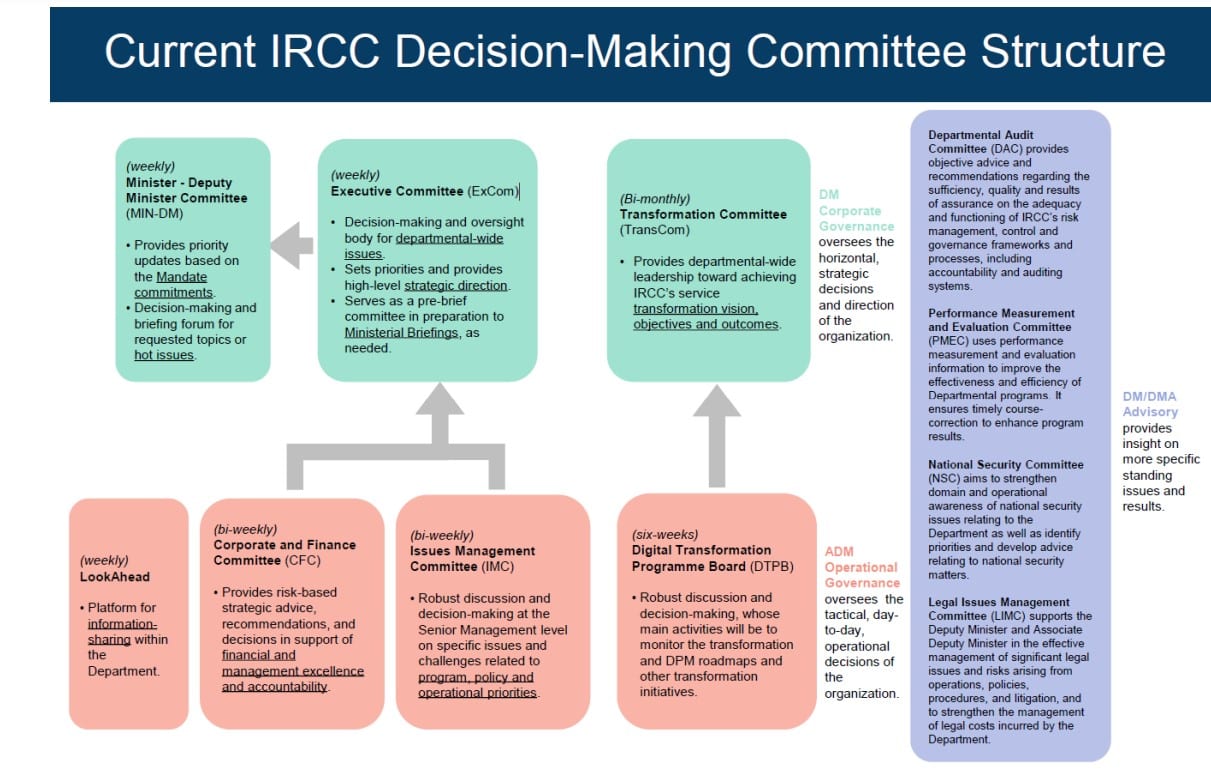Getting to know IRCC’s decision-making committees
A report released by former Deputy Minister of Immigration, Neil Yeates, has brought to light some of the inefficiencies within Immigration, Refugees and Citizenship Canada (IRCC).
Among the issues discussed, Yeates highlights IRCC’s decision-making committee structure as one of the difficulties involved in running the department smoothly.
Yeates says that IRCC committees often exceed the recommended 8-12 members and this “makes strategic discussion a challenge and meetings potentially quite time consuming.”
Discover if You Are Eligible for Canadian Immigration
He further noted that “a series of steps need to be taken to realign the organizational structure (including a major shift to a business line-based structure), reform the governance system, and implement stronger management systems (especially planning and reporting).”
Changing the committee and decision-making process could help improve efficiency within IRCC and help the department meet the growing demand for its services.
The report includes a graphic that explains the current (as of June 2023) committee structure.

IRCC's decision making committees.
Operational Governance committees
IRCC’s decision-making committees are split into three sections. The Operational Governance side deals with decisions that impact the day-to-day operations of the department.
Under this section, four separate committees meet with varying frequency.
Every six weeks, the Digital Transformation Program Board meets to discuss the progress of IRCC’s digital transformation and other transformation initiatives. The committee reports to the Transformation Committee, which operates under the Corporate Governance section.
The Issues Management Committee works at the senior management level and meets bi-weekly for discussions and decision-making surrounding issues related to program, policy, and operational priorities.
The corporate and finance committee also meets bi-weekly to discuss financial and management excellence and accountability. It provides risk-based strategic advice to help support decision-making. Both committees report to the Executive Committee at the corporate governance level.
There is also a weekly “look ahead” committee that acts as a platform for information sharing within the department.
Corporate Governance committees
Three committees fall under the Corporate Governance section of committees.
The Transformation Committee works to provide department-wide leadership aimed at helping IRCC achieve its transformation vision, objectives and outcomes. It is informed in part by the Digital Transformation Program Board.
The Executive Committee meets weekly and acts as a decision-making body for department-wide issues. It is also responsible for setting priorities and providing high-level strategic direction. Further, it acts as a pre-brief committee for ministerial briefings when required.
The final committee at the Corporate Governance level is the Minister-Deputy Minister Committee. This committee provides priority updates based on IRCC’s mandate commitments and acts as a decision-making forum for pressing issues and hot topics.
Deputy Minister and Deputy Minister Associate committees
There are four separate committees under the Deputy Minister and Deputy Minister Associate section of committees.
The Departmental Audit Committee is meant to provide objective advice and recommendations on IRCC’s departmental results framework and program inventory and IRCC’s risk management. This includes accountability and departmental auditing systems.
The Performance Measurement and Evaluation Committee evaluates and measures the performance of IRCC’s programs to enhance program results.
The National Security Committee works to strengthen departmental awareness of security issues that could impact IRCC and identify priorities relating to national security matters.
Finally, the Legal Issues Management Committee works alongside the Deputy Minister and the Associate Deputy Minister of IRCC to help manage legal issues (and their cost) that may arise from operations, policies, procedures, and existing litigation.
Yeates recommendations
Yeates says IRCC’s committee structure impedes the efficiency of decision-making within the department, as many committees and departments are interdependent.
He recommends that IRCC’s committees undergo some restructuring. For example, the report recommends that the Executive Committee take responsibility for finance and corporate services and that the Issues Management Committee be eliminated and a new committee for operations be established. The new Operations Committee should be chaired by the Deputy Minister’s Office.
Additionally, Yeates says there should be a hard cap of 12 on the number of committee members.
- Do you need Canadian immigration assistance? Contact the Contact Cohen Immigration Law firm by completing our form
- Send us your feedback or your non-legal assistance questions by emailing us at media@canadavisa.com





